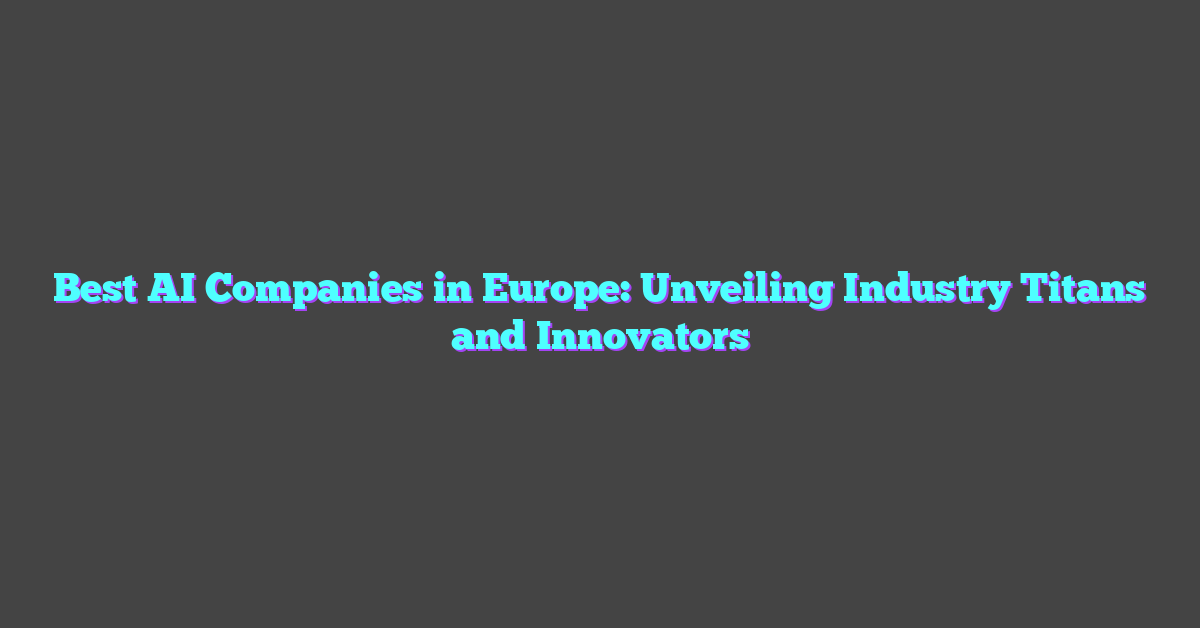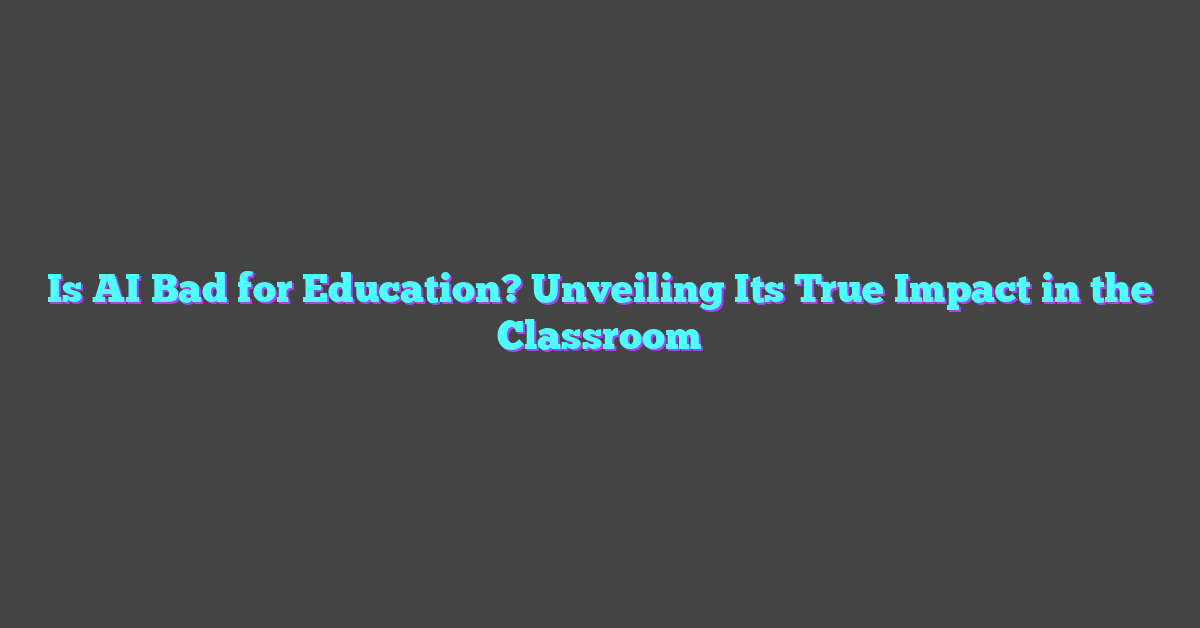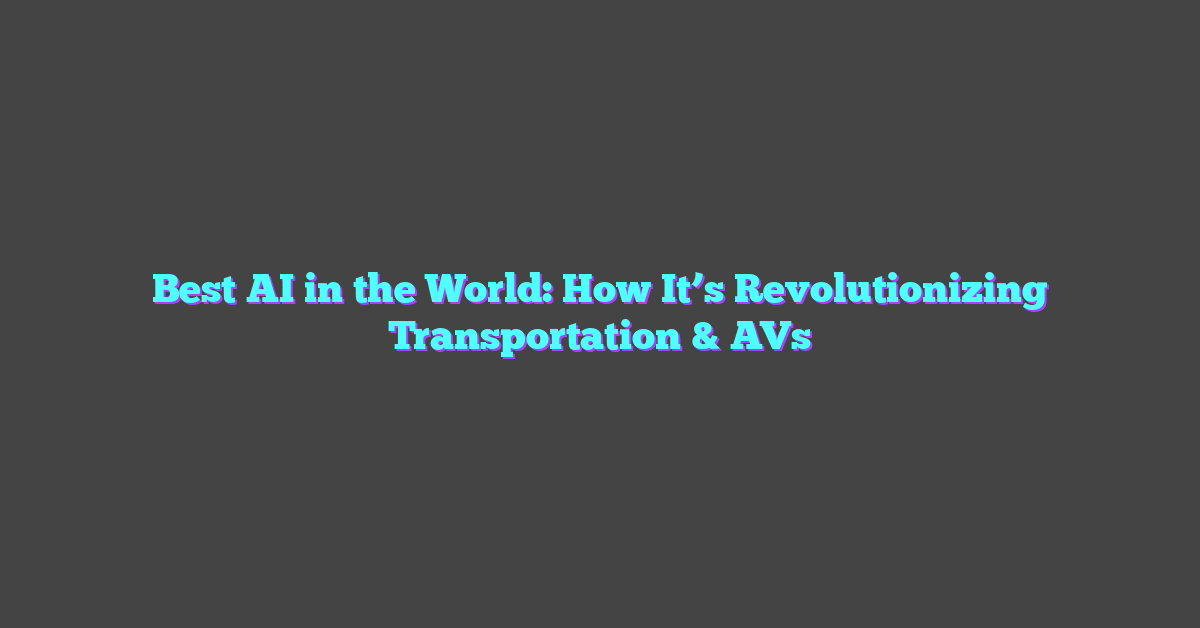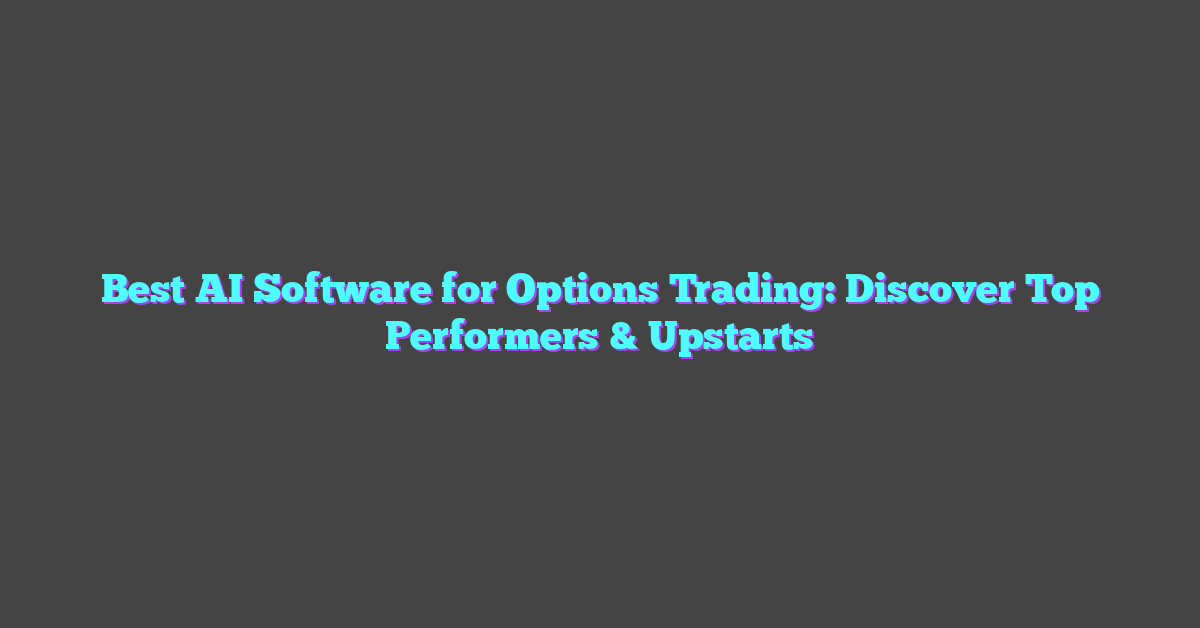Artificial Intelligence (AI) has woven itself into the fabric of daily life, changing everything from how people work to how they relax. With AI’s rapid advancements, society finds itself at a crossroads, questioning whether these innovations are beneficial or detrimental. Some argue that AI’s ability to streamline tasks and enhance productivity is a game-changer.
However, others worry about the ethical implications and potential job losses that come with AI’s rise. The debate continues to grow as AI becomes more integrated into various sectors. Is AI a friend or foe? Let’s explore the multifaceted impacts of this transformative technology on society.
Exploring the Impact of AI on Society
AI influences numerous aspects of daily life, from work environments to social interactions. Its multifaceted impact on society requires a detailed examination.
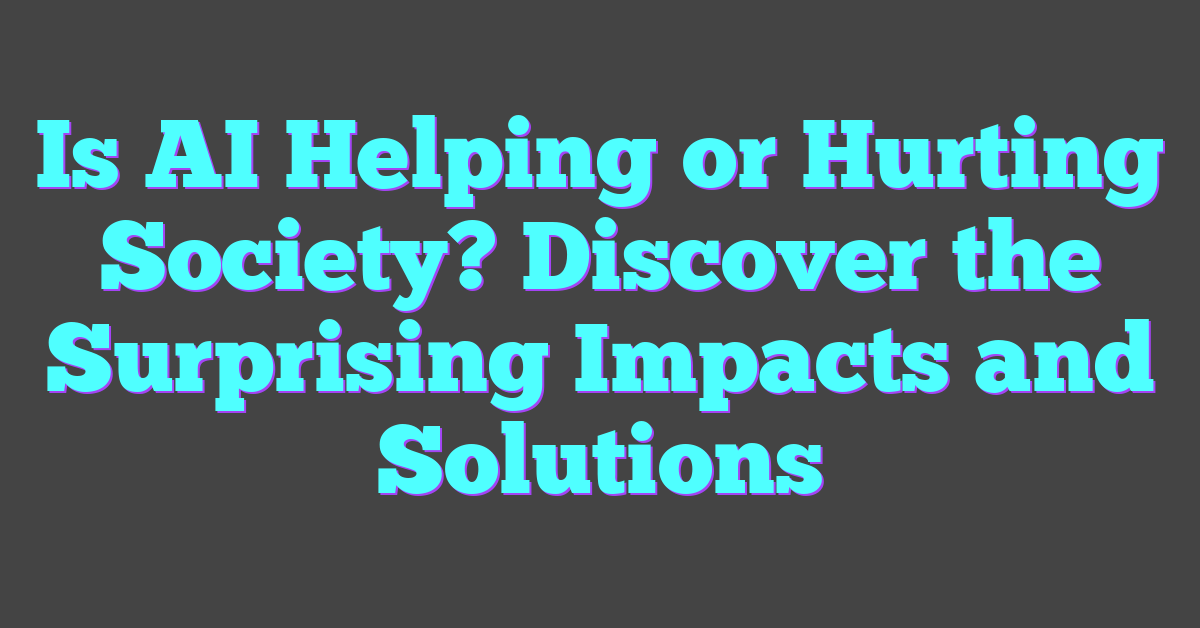
Benefits of AI in Various Sectors
AI improves efficiency, productivity, and user experiences across different sectors:
- Healthcare: AI algorithms analyze medical images, predict patient outcomes, and personalize treatment plans. For instance, AI-powered diagnostic tools can detect diseases like cancer at an early stage.
- Finance: AI strengthens fraud detection, automates trading, and enhances customer service through chatbots. Banks use AI to evaluate credit scores with greater accuracy.
- Retail: AI personalizes shopping experiences by analyzing customer preferences and behaviors. Retailers employ AI for inventory management and supply chain optimization.
- Transportation: Autonomous vehicles and traffic management systems reduce congestion and accidents. AI assists in route planning, making logistics more efficient.
- Education: AI tailors educational content to individual learning styles and paces. Intelligent tutoring systems provide personalized feedback, improving learning outcomes.
Challenges and Risks Associated with AI
AI presents several challenges and risks that society must address to harness its full potential responsibly:
- Ethical Concerns: AI systems can perpetuate biases present in training data, leading to unfair or discriminatory outcomes. It’s crucial to ensure algorithms promote fairness and transparency.
- Job Displacement: Automation may displace certain jobs, especially in sectors reliant on routine tasks. Policymakers and organizations need to focus on reskilling and upskilling workers.
- Privacy Issues: AI’s ability to process vast amounts of data raises concerns about privacy and data security. Clear regulations and robust security measures are essential to protect personal information.
- Security Threats: AI can be exploited for malicious purposes, such as creating deepfakes or automating cyberattacks. Developing robust defense mechanisms is vital.
- Control and Accountability: Determining who controls AI systems and ensuring accountability for AI decisions remain significant challenges. Implementing governance frameworks can help address these issues.
AI’s impact on society encompasses both benefits and risks. Realizing its potential requires balancing innovation with ethical considerations and risk management.
Positive Contributions of AI to Society
Artificial Intelligence significantly benefits society by enhancing various sectors, improving efficiency, and creating new opportunities. Here are some key contributions of AI:
AI in Healthcare
AI revolutionizes healthcare by improving diagnostics, treatment plans, and patient care. Machine learning algorithms analyze medical data, identifying patterns to diagnose diseases accurately. For example, AI can detect early signs of cancer in medical imaging, which reduces the rate of misdiagnosis. AI-driven robots assist in surgeries, ensuring precision and reducing recovery time. Telemedicine platforms utilize AI to provide real-time consultations, making healthcare more accessible.
AI in Education
AI transforms education by personalizing learning experiences and supporting educators. Adaptive learning systems adjust content based on individual student performance, such as platforms that offer customized math problems to enhance understanding. AI-driven analytics help educators identify students’ strengths and weaknesses, allowing targeted interventions. Automated grading systems save time, letting teachers focus more on interactive classroom activities. AI-powered chatbots assist students with queries, promoting continuous learning outside classroom hours.
AI in Environmental Conservation
AI plays a crucial role in environmental conservation by monitoring ecosystems and predicting environmental changes. Machine learning models analyze satellite images to track deforestation, illegal fishing, and wildlife poaching. Remote sensing technologies equipped with AI help in detecting forest fires early, enabling quick response. Predictive analytics support climate modeling, providing insights for policy-making and conservation efforts. AI tools optimize energy consumption in smart grids, reducing carbon footprints and promoting sustainable living.
AI continues to shape a positive future for society by addressing critical areas and enhancing human capabilities across sectors.
Negative Implications of AI on Society
AI undoubtedly brings advancements, but it also poses significant challenges.
Job Displacement Concerns
AI’s integration into various industries leads to automation, which often results in job displacement. For instance, manufacturing sectors increasingly rely on robotic automation, eliminating roles traditionally held by human workers. A report by the World Economic Forum predicts that by 2025, automation might displace 85 million jobs globally in sectors such as data entry, accounting, and customer service. Workers in these roles may need to reskill to adapt to the changing job landscape.
Ethical and Privacy Issues
AI systems sometimes operate with algorithmic biases, raising ethical concerns. For example, biased algorithms in hiring processes can unfairly disadvantage certain groups. Additionally, AI’s widespread use in surveillance technology often intrudes on individual privacy. Governments and corporations collect vast amounts of personal data, sometimes without explicit user consent. If misused, such data can lead to privacy breaches and exploitation, necessitating strict regulations and transparent AI practices to protect individuals’ rights and maintain public trust.
Balancing the Scale: Mitigation Strategies
When considering if AI is helping or hurting society, mitigation strategies are essential for addressing potential drawbacks. Mitigation requires proactive approaches to achieve a balance.
Regulations and Ethical Frameworks
Governments and organizations need strong regulations to ensure AI benefits everyone. Policies should focus on data privacy, decision accountability, and ethical standards. For instance, the European Union’s General Data Protection Regulation (GDPR) sets a precedent by protecting data privacy and giving individuals control over their data.
Industry standards should promote fairness. For example, the IEEE’s Ethically Aligned Design initiative provides guidelines to build ethical AI systems. Companies like IBM have also introduced ethics boards to oversee AI projects, ensuring these technologies adhere to ethical practices.
Advancements in AI Safety and Transparency
Research in AI safety aims to minimize risks. Implementing techniques like adversarial training can make AI systems more robust. Companies such as OpenAI work on creating AI models that are less likely to malfunction or unintendedly harm users.
Transparency in AI operations enhances trust. Explainable AI (XAI) is an emerging field within AI that focuses on making AI decisions understandable to humans. Google’s AI Explainability 360 is a toolkit that helps developers create transparent machine learning models. Another example is DARPA’s XAI program, which aims to produce more interpretable AI systems.
These strategies help in balancing the scale, ensuring AI contributes positively to society while mitigating its potential harms.
Conclusion
AI’s role in society is a complex mix of opportunities and challenges. While it offers remarkable benefits in fields like healthcare and education, it also brings concerns like job displacement and ethical dilemmas. By focusing on regulations, ethical frameworks, and transparency, society can harness AI’s potential while minimizing its risks. The goal is to create a balanced approach where AI serves humanity positively and responsibly.
Frequently Asked Questions
What are the positive impacts of AI on society?
AI has numerous positive impacts, including improved healthcare through predictive analytics, enhanced financial services with fraud detection, and personalized learning experiences in education. These advancements contribute to overall societal progress and efficiency.
How does AI improve healthcare?
AI improves healthcare by helping in early disease detection, personalizing treatment plans, and optimizing hospital workflows. It can analyze large data sets quickly, identifying patterns that might be missed by human clinicians.
What are the negative implications of AI?
Negative implications include job displacement, as automation can replace certain tasks. Ethical concerns arise regarding data privacy, decision-making biases, and the potential for AI to be used in harmful ways.
How can job displacement due to AI be mitigated?
Job displacement can be mitigated by upskilling and reskilling workers, promoting continuous education, and creating new job opportunities in emerging fields. Supportive government policies and industry initiatives can also play a significant role.
What role do regulations play in balancing AI’s impact?
Regulations ensure AI operates within ethical boundaries, protecting public interests and promoting accountability. They help prevent misuse, promote fairness, and ensure AI systems are transparent and safe.
Why are ethical frameworks important in AI?
Ethical frameworks guide the development and deployment of AI systems in a manner that respects human rights, avoids biases, and promotes fairness. They help build public trust and ensure AI benefits society as a whole.
How does transparency in AI operations benefit society?
Transparency in AI operations ensures that stakeholders understand how AI systems work and make decisions. This builds trust, helps identify and correct biases, and ensures accountability in AI applications.
What are industry standards promoting fairness in AI?
Industry standards promoting fairness include guidelines and best practices for developing unbiased AI systems. They involve regular audits, diverse data sets for training AI models, and continuous monitoring to ensure fairness and equity.
How does AI safety advancement minimize potential harms?
Advancements in AI safety focus on creating robust and reliable systems that can operate without causing unintended harm. These include rigorous testing, implementing fail-safes, and continuous research on potential risks.
Can AI benefit society while minimizing potential harms?
Yes, AI can benefit society while minimizing potential harms through a combination of regulations, ethical frameworks, transparency, and robust safety measures. Continuous dialogue among stakeholders is crucial to achieve this balance.

